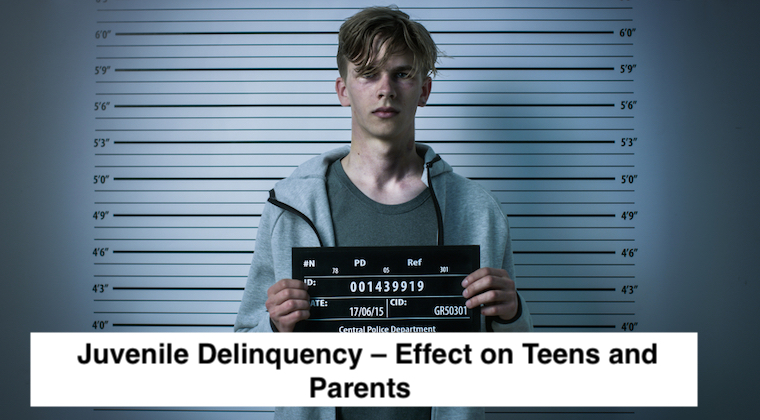+1 845 259 2974 (11 a.m to 7 p.m CST)
Effects of Juvenile Delinquency on Teens and their Parents

Juvenile delinquency refers to illegal or antisocial behaviors by minors, typically those under 18. These behaviors range from minor infractions to serious crimes and have significant consequences for both the teens involved and their families. Addressing juvenile delinquency is crucial because it affects the well-being and prospects of young individuals and imposes emotional and financial strains on their parents.
Unchecked delinquency can lead to higher crime rates and societal instability. Effective monitoring, including digital tools and parental involvement, can play a vital role in mitigating these issues. By closely tracking and guiding teens' activities, parents and guardians can intervene early, provide necessary support, and help steer their children toward positive behavior.
Impact on Teens
Psychological Effects
Juvenile delinquency can significantly harm a teen's mental health, leading to long-lasting consequences. Engaging in illegal or antisocial behavior often stems from underlying issues and further exacerbates psychological distress.
- Anxiety: Teens involved in delinquent activities frequently worry about being caught or punished, leading to constant stress and fear.
- Depression: Persistent involvement in delinquency can lead to feelings of hopelessness and sadness, as teens struggle to see a positive future.
- Low Self-Esteem: Negative self-perception and guilt from their actions contribute to a diminished sense of self-worth, often worsened by criticism from peers and adults.
Academic Performance
Delinquent behavior has a direct impact on a teen's education, which can affect their future opportunities.
- Drop in Grades: Lack of focus, motivation, and interest in schoolwork can lead to declining grades. Delinquent teens may struggle to keep up with assignments and exams, resulting in poor academic performance.
- School Attendance: Increased absenteeism due to truancy or suspension is common among delinquent teens. Missing school days hinders their learning and progression, creating a cycle of academic failure.
Social Consequences
The social impact of delinquency is profound, affecting a teen's ability to form and maintain healthy relationships.
- Peer Relationships: Teens involved in delinquent activities may face strain in their friendships. Positive peers may distance themselves, leading to a reliance on other delinquent individuals, perpetuating the cycle.
- Isolation: As teens withdraw from constructive social interactions, they often experience loneliness. This isolation can further push them towards negative behaviors and away from supportive environments.
Legal Repercussions
The legal consequences of juvenile delinquency can have long-lasting effects on a teen's life, influencing their future in multiple ways.
- Criminal Record: Having a criminal record can severely limit future opportunities. It can affect college admissions, scholarship opportunities, and even housing applications.
- Future Opportunities: A tarnished reputation and a record of delinquency can reduce job prospects and career advancements. Employers often hesitate to hire individuals with a criminal background, making it difficult for these teens to build successful careers.
Addressing these impacts is crucial for the well-being and prospects of delinquent teens. Early intervention and support can help mitigate these negative effects and steer teens toward a more positive path.
Impact on Parents
Emotional Toll
Parents of delinquent teens often experience significant emotional stress, which can have a lasting impact on their well-being.
- Stress and Worry: Constant concern about their child's safety, future, and potential for further legal trouble. This persistent anxiety can lead to sleep disturbances and other health issues.
- Guilt: Many parents blame themselves for their child's behavior, feeling that they have failed in their parenting duties. This guilt can lead to depression and a sense of helplessness.
Financial Burden
Juvenile delinquency can impose heavy financial strains on families, affecting their economic stability.
- Legal Fees: The costs for attorneys, court expenses, and potential fines can be substantial, draining family resources.
- Potential Loss of Income: Parents may need to take time off work to handle legal issues, attend court dates, or participate in counseling sessions, resulting in lost wages and financial hardship.
Family Dynamics
Delinquency can disrupt family harmony, creating a tense and challenging home environment.
- Strain on Relationships: Increased tension between parents and children can lead to frequent arguments and a breakdown in communication.
- Family Cohesion: Maintaining a supportive and united family environment becomes difficult as stress levels rise. Siblings may also feel neglected or affected by the family's focus on the delinquent teen.
These impacts highlight the importance of support for parents dealing with juvenile delinquency, helping them manage stress, financial burdens, and family dynamics effectively.
The Role of Monitoring
Types of Monitoring
Various monitoring methods can help manage juvenile delinquency and provide support to at-risk teens:
- Digital Tools: Apps and software can track online activities, location, and communication, alerting parents to any concerning behavior. These tools can offer real-time updates and reports.
- Parental Involvement: Regular check-ins, open communication, and setting clear rules and expectations help parents stay informed and involved in their teens' lives. This involvement fosters trust and encourages teens to make better choices.
- Community Programs: Local initiatives, mentorship programs, and support groups provide guidance, supervision, and positive role models. These programs offer structured activities and resources to keep teens engaged and out of trouble.
Benefits of Monitoring
Effective monitoring offers several advantages for both teens and their families:
- Early Intervention: By identifying and addressing issues early, parents and guardians can prevent minor problems from escalating into serious delinquent behavior. Early intervention can include counseling, mentoring, or other support services.
- Behavior Tracking: Monitoring tools allow parents to keep tabs on their teens' activities, helping to identify patterns of behavior that may lead to delinquency. This tracking can help in setting appropriate boundaries and consequences.
- Support: Continuous guidance and access to resources provide a safety net for teens, helping them navigate challenges and make positive decisions. Supportive monitoring also reassures teens that they are cared for and supported.
Case Studies/Examples
Success stories highlight the positive impact of effective monitoring on reducing juvenile delinquency:
- Example 1: A teen's behavior improved significantly with the use of a tracking app that alerted parents to risky online activities. With timely intervention and support, the teen's school performance and social behavior improved.
- Example 2: Community programs in a high-risk neighborhood helped reduce local delinquency rates. By providing structured activities, mentorship, and educational support, these programs created a safer environment and fostered positive development among teens.
These examples demonstrate how monitoring can positively influence outcomes for teens and families, reducing delinquency and promoting healthier, more productive lives.
Preventive Measures
Parental Involvement
Active parental involvement is crucial in preventing juvenile delinquency.
- Open Communication: Maintaining an open dialogue with teens helps build trust and allows parents to understand their children's concerns and challenges. Regularly discussing daily activities, friends, and feelings can make teens feel valued and supported.
- Setting Boundaries: Establishing clear rules and expectations helps teens understand acceptable behavior. Consistent enforcement of these boundaries, along with appropriate consequences, guides teens in making responsible choices.
Education and Awareness
Education and awareness play vital roles in preventing delinquency by equipping teens and parents with the knowledge and skills they need.
- Programs for Teens: Workshops, seminars, and educational programs focused on life skills, decision-making, and the consequences of delinquent behavior can empower teens to make better choices.
- Resources for Parents: Providing parents with resources, such as parenting classes, support groups, and informational materials, helps them understand the challenges their teens face and how to effectively address them.
Community Support
Community support systems are essential in creating a safe and nurturing environment for teens.
- Role of Schools: Schools can offer counseling services, extracurricular activities, and after-school programs that engage students and provide positive outlets for their energy and creativity. Educators can also identify at-risk students and provide early intervention.
- Local Organizations: Community centers, youth clubs, and non-profit organizations can offer programs and activities that keep teens occupied and away from negative influences. These organizations often provide mentorship and support networks.
- Law Enforcement: Law enforcement agencies can collaborate with communities to implement youth outreach programs and provide resources for crime prevention. Positive interactions with law enforcement can help build trust and prevent delinquent behavior.
Implementing these preventive measures can significantly reduce the risk of juvenile delinquency, ensuring a healthier and more positive development path for teens.
Juvenile delinquency has profound effects on both teens and their parents, impacting mental health, academic performance, social relationships, and future opportunities. For parents, the emotional and financial burdens can be overwhelming, straining family dynamics and relationships. Monitoring, whether through digital tools, parental involvement, or community programs, plays a crucial role in mitigating these impacts by providing early intervention, behavior tracking, and continuous support.
Preventive measures, including active parental involvement, educational programs, and robust community support, are essential in addressing the root causes of delinquency and guiding teens toward positive behaviors. Open communication, clear boundaries, educational resources, and community engagement create a supportive environment that fosters healthy development and reduces the likelihood of delinquent behavior.























